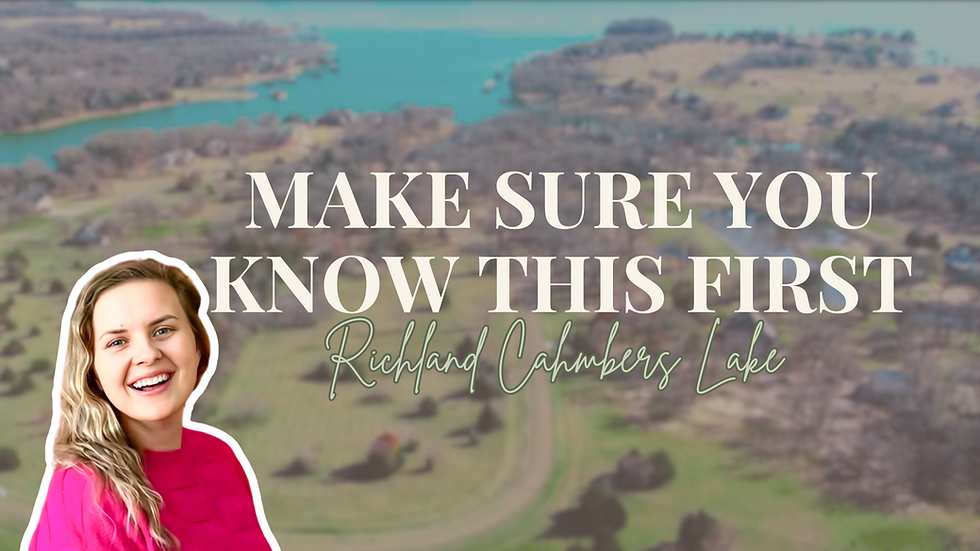Things to Know Before Buying a Lakefront Property | Richland Chambers, Cedar Creek Lake
- Miriah Zuniga
- Apr 17, 2025
- 4 min read
You’re thinking about buying a Lakefront property—maybe it’s a quiet retreat, a weekend getaway, or even your full-time lakefront lifestyle. Before you dive in, there are a few things you need to know to ensure you’re getting the right property for your needs. Because buying a lake house? It’s not quite the same as buying a regular home.
In this post, I’ll break down seven key things that can make or break your lakefront experience.
1. Check the Water Depth & Lake Levels
Not all lakefront properties are created equal when it comes to water depth. Some areas stay deep year-round, while others—especially in coves—can get really shallow during dry seasons.
If you plan to dock a boat, jet ski, or even swim, make sure the water depth is right for your needs.
Pro tip: Look at historical lake levels and ask local neighbors about how the water fluctuates. They’ll give you a better idea of what to expect over time.
2. Understand the Shoreline & Erosion Control
Erosion is a big concern for lakefront homes, especially on open-water lots. The constant movement of water can wear down the shoreline over time.
Here are a few things to ask yourself:
Does the property have a natural shoreline, a retaining wall, or a bulkhead?
Will you need to install erosion control measures down the road?
How does wind and wave action affect the shore?
Pro tip: Open-water lots usually face more erosion risks, while coves tend to have more protected shorelines.
3. Verify Dock & Boathouse Regulations
Just because you own waterfront land doesn’t mean you can automatically build a dock. Some areas have strict HOA or county rules about what’s allowed.
Before buying, check with:
The local water authority or HOA to confirm:
Can you build a dock?
What size and design are allowed?
If there’s already a dock, is it structurally sound?
This step can save you thousands of dollars and prevent a major headache down the road.
4. Inspect for Flood Risks & Insurance Costs
Living on the water does come with some flood risks. Some lakefront properties sit higher, but others are more prone to flooding during heavy rains.
Here’s what to do before buying:
Check FEMA flood maps to see if the property is in a flood zone.
Ask about flood insurance costs—even if it’s not required, it might be a smart investment.
Look for signs of past flood damage, like water stains on docks, retaining walls, or the home itself.
5. Research the HOA & Community Rules
If the property is part of a lakefront community, there’s a good chance it has an HOA or deed restrictions. Make sure to do your due diligence:
Before buying, find out:
Are short-term rentals (Airbnb, VRBO) allowed?
Are there restrictions on building, fencing, or landscaping?
Does the HOA maintain amenities like boat ramps or docks?
Pro tip: Even if there’s no HOA, check for deed restrictions—they can still limit what you can do with your property.
6. Evaluate the Accessibility & Road Conditions
Not all lakefront properties are easy to access. Some may be on private roads that aren’t well-maintained, which can be problematic in bad weather.
Is the road paved and maintained year-round?
How far is the nearest grocery store, hospital, or gas station?
If you don’t have a dock, where’s the closest boat ramp?
Pro tip: Drive to the property at different times of day to check road conditions—especially when it rains, at night, or on busy weekends.
7. Consider Utilities & Internet Availability
Some remote lakefront properties don’t have access to city water, sewer, or even high-speed internet.
Before buying, ask:
Does the property have city water and sewer, or will you need a well and septic?
How is internet and cell service? (This is especially important if you work remotely!)
Are utilities like propane or electric readily available?
Pro tip: If the home uses well water, get it tested to ensure it's safe and reliable.
Make a Smart Investment
Buying a lake house is exciting—but it’s not like buying a regular home. By checking these seven things, you’ll avoid major surprises and ensure you’re making a smart investment that fits your lifestyle.
Want to Learn More?
If this guide was helpful, be sure to hit that like button and let me know in the comments—what’s your biggest must-have for a lakefront property?
Also, if you’re preparing for your move to the area, make sure to check out my other blogs on things you must do before moving to the lake! I’m here to help you navigate this process smoothly.
My name is Miriah Zuniga, and I specialize in helping people like you find the perfect lakefront property. If you’re ready to take the next step, I’d love to guide you through this exciting journey!










Comments